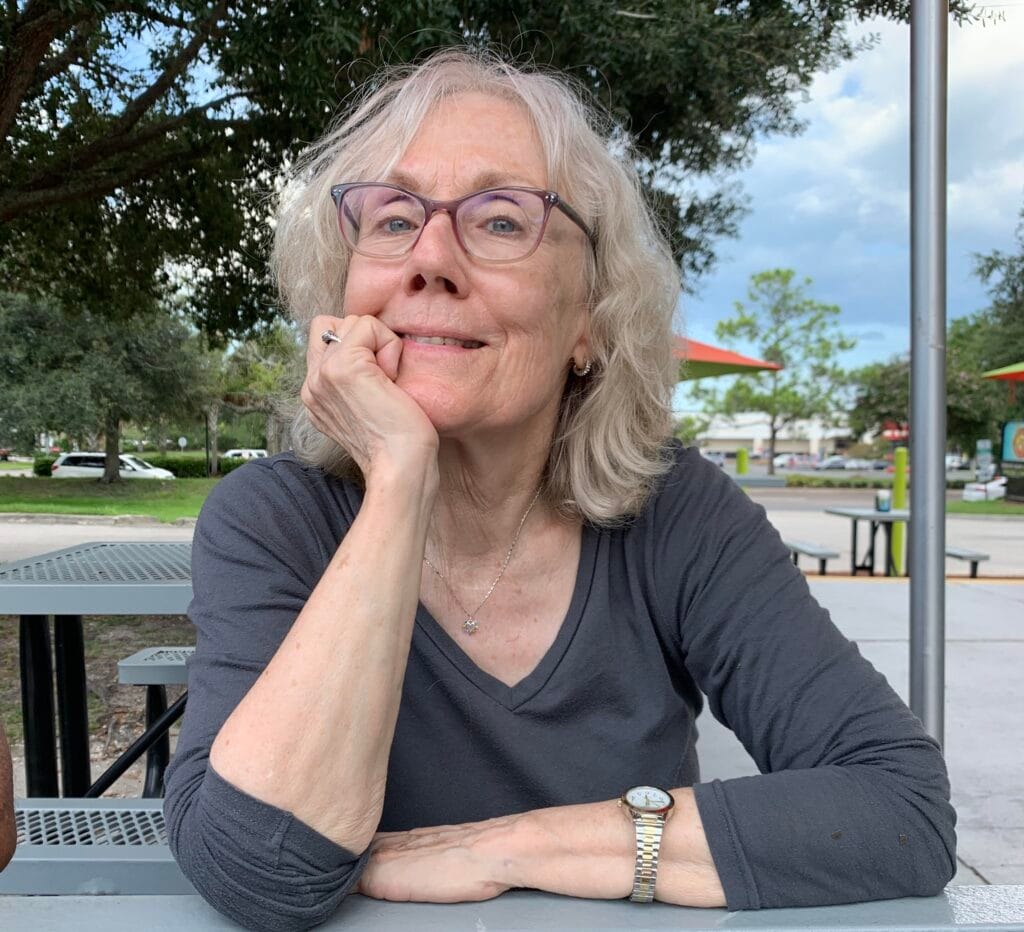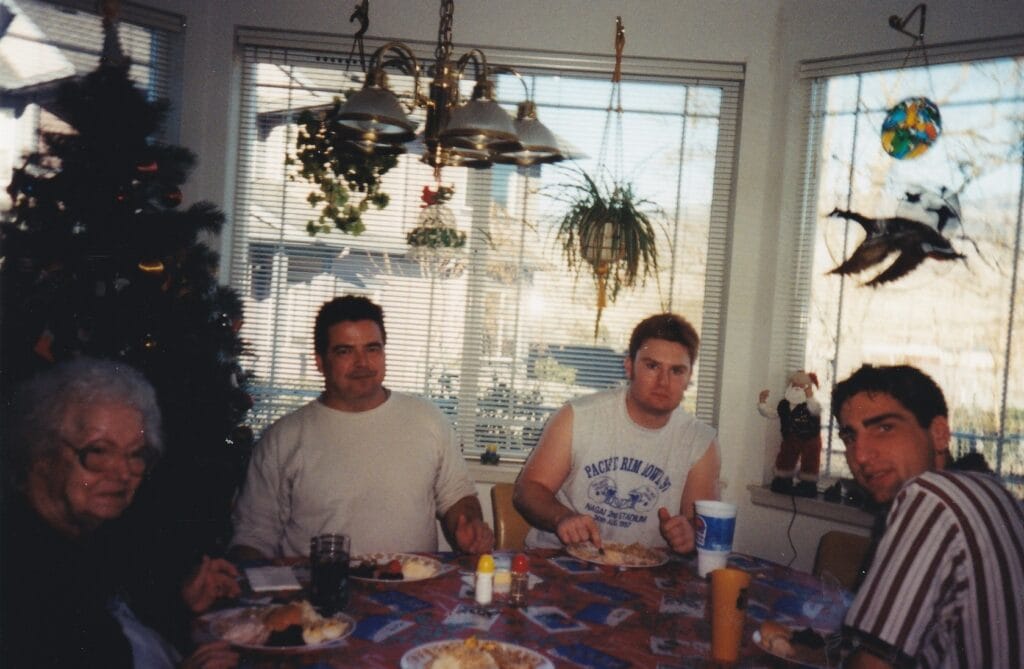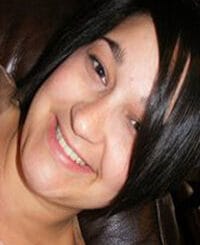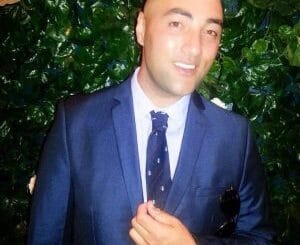Karen Money Williams

She is the script editor of Sean Parlaman’s Stud City.
SKSM: Could you start with telling me a little bit about yourself? And what do you do and/or what have you done?
Karen Money Williams: I’m a longtime freelance writer and editor and have published 12 e-books on my favorite subjects of humor and Law of Attraction (Abraham-Hicks). I live with my husband in Florida with our four rather demanding cats. My daughter Emily is a librarian in the area, and my son Aaron is a data analyst who also teaches statistics at our local university. My other son Joel is an attorney in Houston, TX. All three of my children were close friends of Sean Parlaman years ago when we all lived in Ashland, OR.
SKSM: Where does the name “money” come from? Or did you inherit this from your parents?
Karen Money Williams: “Money” is my family/maiden name. I began using it as a middle name for clarification after I became active on Facebook some years ago.
SKSM: When did you know you wanted to become an (script-)editor/writer?
Karen Money Williams: I have always loved writing and editing. Although psychology was my intended career path in college, I also took creative writing courses and found I could pursue that and work from home when my kids were small.
SKSM: How did you become involved in Stud City (Dollar Baby-) film?
Karen Money Williams: Sean Parlaman (“Buzz” to his mother) was a man of many talents and many projects. One day he casually asked me to look over his script for “Stud City.” I happily complied with copy-editing and made a few suggestions for larger changes, as I recall.

SKSM: Stud City was never made? Do you know why? Has Sean ever mentioned this to you?
Karen Money Williams: As I mentioned, Sean was a person with many interests in the area of film (and also politics and sports). He was vastly creative and would sometimes become immersed in a new project before bringing a previous one to fruition.
SKSM: What do you think it is about the story that attracts people so much? After so many years.
Karen Money Williams: In “Stud City,” the suspense steadily builds while we ask ourselves how the main character at age 19 could already be so hardened, bitter and cynical. This is probably part of the reason for the story’s lasting appeal.
SKSM: What was your role as (script-) editor in the film?
Karen Money Williams: My role as script editor was basically looking for mundane grammar and spelling errors. I did give Sean my basic feelings about the script – a minimal, overall critique.
SKSM: Are you a fan of Stephen King’s work?
Karen Money Williams: While many of my family and friends are fans of Stephen King’s work, I find that horror is not the genre for me.
SKSM: You worked with Sean Parlaman on this film, how was he as a director or friend?
Karen Money Williams: Sean was an utter delight in all contexts. He was pleasant, agreeable, had a vast knowledge of pop (current) culture, had an intellectual bent, and most of all, perhaps, had a clever sense of humor that just wouldn’t quit.
SKSM: How and when did you meet Sean?
Karen Money Williams: I met Sean through my husband Ed Williams (now deceased). Sean met Ed through their mutual attendance at a Tai Kwon Do class at our town’s YMCA. Sean would come by our house on karate evenings around dinner time to go to class with Ed, and it was then we got to know and love him. He always teased me about eating “dead carcass,” as Sean was a strict vegetarian. Eventually I became a vegetarian, too, although not as strict as Sean. This was in the late 1980s.
SKSM: Sean is known by multiple names such as Buzz Parlaman, Sean Parlaman, and Sean Simmons. Why did Sean this. Wasn’t this a bit confusing?
Karen Money Williams: Sean’s mom, Doris Parlaman, always called him “Buzz.” We knew him as Sean. I think Sean Simmons was some sort of stage name. Sean had been an extra in various movies during the time he lived in Southern California (San Bernadino). He once showed us a film clip where he was a policeman who rushed a person in a wheelchair out of the line of fire during an urban shoot-out.

SKSM: Was Sean a family man? Or was there no family in his life?
Karen Money Williams: Sean did not have a family but took care of his mother, who had had a stroke, for quite a few years, both when we knew him in Ashland and later when they both moved to Thailand. Sean also had a brother, Michael, whom I never met. They weren’t close. Sean fell in love with Thailand and the people after visiting there as part of his studies at Southern Oregon State College in Ashland. As an adult, Sean took classes at SOSC with an emphasis in journalism.
SKSM: Are there any fun or special moments you experienced with Sean over the years you were friends.
Karen Money Williams: My kids and I experienced countless fun and memorable moments with Sean over the years. He would come to our home often on his trusty bicycle, and some neighbors took him to be my son. He attended “movie night” on Saturdays at my house (after my husband Ed died from sudden cardiac arrest at karate class) and would bring a rented movie that he had chosen for the occasion. Using my car, he would drive us up to Mount Ashland to the Buddhist temple and tell my young daughter about that belief system. He would drive us to out-of-town high school football games when my son Joel’s team ultimately won the Oregon state championship. When it was time for Joel to consider colleges, Sean, a faithful Quaker who attended the local meeting, encouraged Joel to apply to my Quaker alma mater, Earlham College in Richmond, Indiana. That’s where Joel spent the next four years. By that time, Sean was ready to make a permanent move to Thailand, where he wrote us of countless funny anecdotes resulting from his trying to learn the language but having some major flub-ups. Of course, Sean had always accumulated funny anecdotes, for he saw life through a humorous lens, and the expression on his face was one of perpetual near-amusement. He knew I was hoping to move to a warmer part of the country for health reasons and suggested Florida. That is where I did indeed move in the year 2000 and have been here since then.
SKSM: Sean passed away on November 23, 2002. What was your reaction when you were informed of my death?
Karen Money Williams: I was shocked and saddened and yet not wholly surprised. Sean rarely phoned me from Thailand, but the last time, he sounded frantic, fearing that he was about to be put in a Thai prison for his work on behalf of young people who were sold (usually by their poverty-stricken families) into sex trafficking. He had been working alongside a Christian minister on this issue and had angered some of the powers-that-be. He felt they were closing in on him. So when I later heard that the police had indeed come to the condo he shared with his mother to arrest him, and that he had supposedly jumped out a high window, it all painfully added up. Sean died as he lived – a social activist and champion of those who are less fortunate.
SKSM: 21 years is a long time, how does it make you feel talking about Sean again?
Karen Money Williams: Sean had so much to give; I wish he were still living in human form. However, I have had some “signs” that his spirit lives on, and in fact, I feel a vibrant connection to Sean right now as I write this. It is a touching and revealing feeling, reminding me that no one dies so much as they change form, and they can connect with us when we are in a place of strong optimism and receptivity.

SKSM: You write books yourself, what kind of books are these?
Karen Money Williams: My e-books on Amazon include these about the Abraham-Hicks perspective (mental wellness and spirituality): Soulsongs Vol. 1, 2, 3, 4; Positive Thinking on Steroids; Ask an Aber; It’s a Beautiful Day in the Aber-Hood; 15 Flawed Premises That Trip People Up; How Life Works: Things I Learned at Abraham’s Knee. I also wrote a humor book, How I Moved to Florida & Darn Near Made It Big, as well as a memoir of my experience as a young adult with advanced Hodgkin’s lymphoma.
SKSM: What are you working/doing on nowadays?
Karen Money Williams: I host a Facebook page, Abraham Fun, with 50,000 members, so that keeps me hopping. I also regularly share “Money’s Funnies” online – humorous memes and comics. Beyond that, I love to garden and play piano for my own amazement and I always welcome visits from my two granddaughters, ages 24 and 14. They never met Sean, but they’ve heard the memorable tales of him from their dads, my sons.
SKSM: What is one thing people would be surprised to know about you?
Karen Money Williams: I was for many years a committed evangelical Christian while living in my home state of Indiana. I treasure those memories.
SKSM: Where do you see yourself in 5 years?
Karen Money Williams: In five years, I’ll be nearly 79. I hope to continue the projects that I love so much.
SKSM: Thanks for taking the time to answer my questions. Is there anything you want to say to the fans that read this interview?
Karen Money Williams: I’ll close by sharing two of Sean’s Thailand anecdotes. (1) He was becoming more conversant when he entered a convenience store where a big cat lay sleeping on a shelf. In Thai, he asked the woman in charge if she had cat food. (Sean loved cats and had adopted some street strays.) She stared daggers at him, grabbed the cat, and stomped to the back room. It turned out he had asked if she had cat for food instead of food for cats. (2) Another mistake occurred when he told his roommate there in Thailand of a wonderful restaurant he’d found. The roommate replied that he was almost certain there was no restaurant at the location Sean described. Puzzled, Sean returned to the location the next day only to find that his roommate was correct. Sean had mistaken a family gathering on the porch for a restaurant, and the family had cordially served him the food he requested. It was that hospitable trait of the Thai people that deeply endeared them to Sean and prompted him to locate there permanently.
SKSM: Do you like to add anything else?
Karen Money Williams: And one last anecdote of my own: The day after I received news of Sean’s death in Thailand, I was outside my home here in the Orlando area when an older African American man in an old beater car slowed to a stop and rolled down his window. “Do you know where White Dove Way is?” the man asked. “No, I have no idea,” I replied. “Sorry.” He slowly drove on down the street. Later that day, I went to the grocery store and happened to see a sign for a little side street: “White Dove Way.” Too bad I’m still new in the neighborhood, I thought. Maybe I could have told the man where the street is. Two nights later I went to a neighboring town for a weekly spiritual meeting with new friends I’d met, Mark and JoJean. Mark proceeded to tell of an odd occurrence he’d had that past weekend. While he was working in his yard, a white dove had flown onto his shoulder and stayed there for the longest time! He called his wife to come and look, and they both were amazed. The bird flew away to the rooftop a few times but continued to return to Mark’s shoulder. It even went into the house with him for a while until they encouraged it to leave! When Mark and JoJean told me of this unusual encounter, I related the story of the man in the beater car asking me how to get to White Dove Way. I also told of how I’d gotten word that week of the death of a dear family friend, Sean, in Thailand. We three concurred that the white dove experience Mark had as well as the man asking directions could have related in some way to Sean and was perhaps his way to communicate with me. A dove seemed a perfect emblem for this man who was appreciated wherever he went and who now flew free.
















